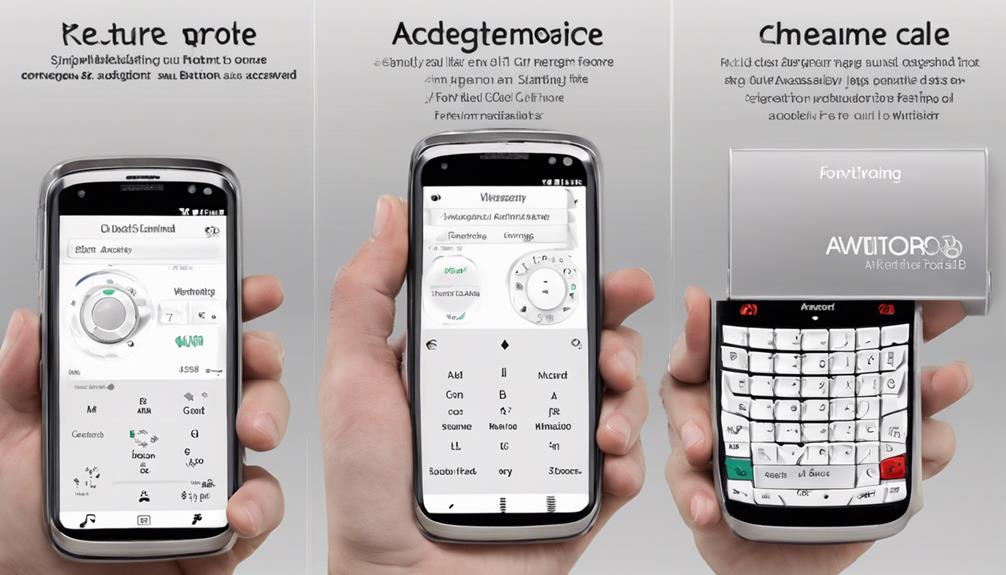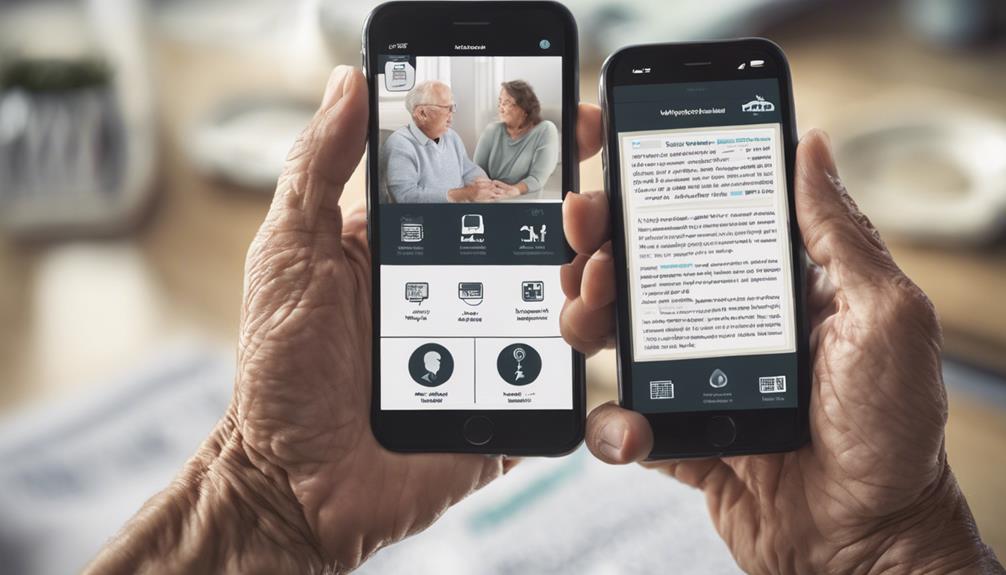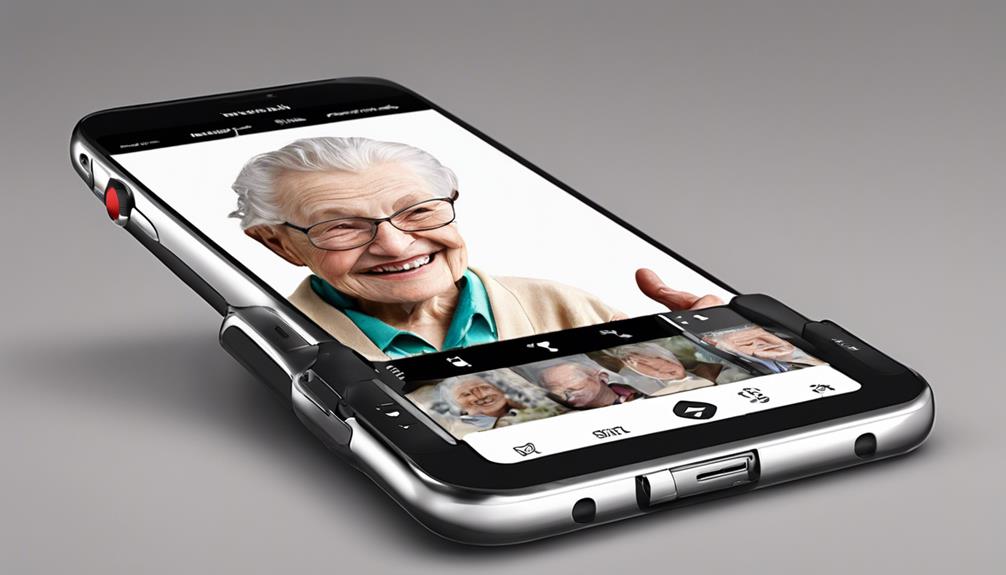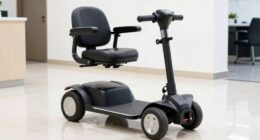After my grandmother was diagnosed with dementia, it became important to find a suitable cell phone for her. It can be overwhelming to search for a phone that combines ease of use with security features.
However, one must consider various factors to make an informed decision. From user-friendly interfaces to emergency assistance features, the ideal cell phone for seniors with dementia should cater to their unique needs and provide peace of mind to both the users and their families.
Key Takeaways
- Large screens and simple buttons aid seniors with dementia.
- Emergency buttons and safety features ensure quick help access.
- Memory aid applications provide reminders and medication tracking.
- Extended battery life offers uninterrupted connectivity and peace of mind for caregivers.
Top Features to Consider
When selecting a cell phone for seniors with dementia, we must prioritize features that enhance usability and promote safety. A memory phone tailored for seniors with dementia should include safety features such as emergency call functions, ensuring help is always within reach. Voice-activated calling is essential, allowing seniors to make calls easily even if they struggle with memory issues. Large buttons on the phone enable straightforward dialing, reducing confusion and frustration. A long-lasting battery is crucial to keep the device operational throughout the day, providing continuous connectivity for seniors with dementia.
Memory-enhancing apps can further support cognitive function, aiding in tasks like remembering important numbers or appointments. A user-friendly interface is key, simplifying navigation and reducing the likelihood of confusion. Ensuring that essential numbers are easily accessible on the phone enhances convenience and safety for seniors with dementia, enabling them to reach loved ones or emergency services promptly. By prioritizing these features, we can select a cell phone that truly meets the needs of seniors with dementia.
User-Friendly Design Options

Considering the challenges seniors with dementia may face, user-friendly design options play a crucial role in enhancing their experience with cell phones. To help seniors with dementia navigate the complexities of technology, here are some key user-friendly design options to consider:
- Large Screens and Simple Buttons: Phones with large screens and straightforward buttons can make it easier for seniors with dementia to interact with the device.
- Voice-Activated Calling and Prompts: Devices that offer voice-activated calling and prompts can assist seniors in making calls without struggling with complex interfaces.
- Safety Features like SOS Functions: Phones with safety features like SOS functions provide peace of mind for both seniors and their families in case of emergencies.
- Memory-Enhancing Apps and Long-Lasting Battery: Opting for phones with memory-enhancing apps and long-lasting battery life can help seniors with dementia stay connected and engaged throughout the day.
Safety and Emergency Assistance
To ensure the safety and well-being of seniors with dementia, incorporating features like emergency assistance and location tracking in cell phones is paramount. The RAZ Memory Cell Phone offers an emergency button for quick access to help in distressing situations, along with location tracking capabilities, providing an extra layer of safety.
With limited incoming calls and a dedicated 911 button, this phone ensures that emergency assistance is readily available at the touch of a button. RAZ Mobility's service efficiently routes emergency calls through a dispatch agent, preventing unnecessary 911 calls from seniors with dementia. Moreover, text alerts can be sent to family members to cancel accidental 911 calls, offering peace of mind and a sense of control over emergency situations.
Memory Aid Applications

How can memory aid applications on phones benefit seniors with dementia?
Memory aid applications provide crucial support for seniors with dementia by offering reminders, organization tools, and tracking features that can significantly enhance their daily lives. Here are four ways these applications can make a difference:
- Reminders: Memory aid apps offer timely reminders for tasks, appointments, and medications, helping seniors with dementia stay on track and reduce the risk of missing important events.
- Visual Cues: By incorporating visual cues and interactive calendars, these apps stimulate memory retention and assist in creating structured routines for individuals with dementia.
- Audio Prompts: The audio prompts in these applications provide additional support by offering verbal reminders and notifications, catering to seniors who may benefit from auditory cues.
- Medication Tracking: With features like medication tracking, seniors with dementia can manage their prescriptions more efficiently, promoting independence and cognitive function while ensuring proper medication adherence.
Memory aid applications are designed to be user-friendly and customizable, empowering seniors with dementia to maintain a sense of independence and control over their daily lives.
Long Battery Life Essentials
Memory aid applications play a crucial role in supporting seniors with dementia. When considering essentials for their phones, long battery life becomes a vital necessity for uninterrupted communication and convenience.
Seniors with dementia benefit greatly from phones with extended battery life, as it ensures they can stay connected and safe without the need for constant monitoring or charging. Phones that offer days of usage without needing to be charged are especially practical for this demographic, allowing them to have continuous access to their device without worrying about running out of battery.
The extended battery life feature not only provides convenience but also peace of mind for caregivers and family members, knowing that communication lines remain open. With reduced concerns about battery life, seniors with dementia can focus on using their phones for memory aids, staying connected with loved ones, and accessing assistance whenever needed, making it a crucial aspect to consider when choosing a cell phone for this demographic.
Frequently Asked Questions
What Is the Best Phone for Elderly People With Dementia?
When looking for a phone for elderly individuals with dementia, simplicity and ease of use are key. Essential features like photo contacts and an emergency button can greatly benefit seniors with memory loss.
Additionally, safety features such as limited incoming calls and location tracking can provide peace of mind for caregivers.
Ultimately, a phone that prioritizes straightforward communication and safety measures is ideal for seniors with dementia.
What Is the Easiest Cell Phone for an Elderly Person to Use?
We find that the easiest cell phone for an elderly person to use is one that prioritizes simplicity and essential features.
A phone with voice call capability, emergency button, and easy access to important contacts can greatly enhance usability. Eliminating complex settings and apps can make placing calls intuitive and stress-free.
Having a user-friendly design, such as an always-on home screen, can further improve the experience for seniors.
Should a Person With Dementia Have a Cell Phone?
We believe that individuals with dementia should have cell phones for safety and connection. These devices offer crucial features like SOS buttons and GPS tracking, providing peace of mind for caregivers.
Specialized phones with simplified functions and pre-programmed contacts make calling easier. Remote management features allow caregivers to monitor usage.
What Is the Best Entry Level Smartphone for Seniors?
When seeking a smartphone for seniors, simplicity and usability reign supreme. Look for devices with intuitive interfaces and straightforward features. Consider models that prioritize ease of navigation and clear communication. Accessibility options and larger text sizes can enhance usability for older users.
Prioritize comfort, functionality, and ease of use above all else when selecting the ideal entry-level smartphone for seniors.
Conclusion
In conclusion, when choosing the best cell phone for seniors with dementia, it's important to prioritize:
- User-friendly design,
- Safety features,
- Memory aids, and
- Long battery life.
The RAZ Memory Cell Phone offers simplicity and essential functions tailored to their needs, making communication easier and safer.
Remember, finding the right phone can provide seniors with dementia with a sense of independence and security, helping them stay connected and supported in their daily lives.









